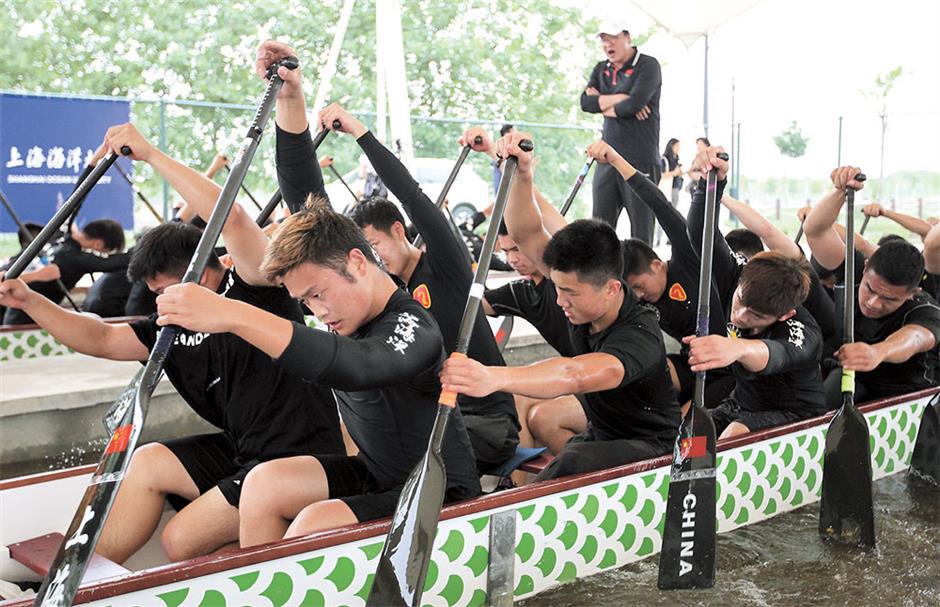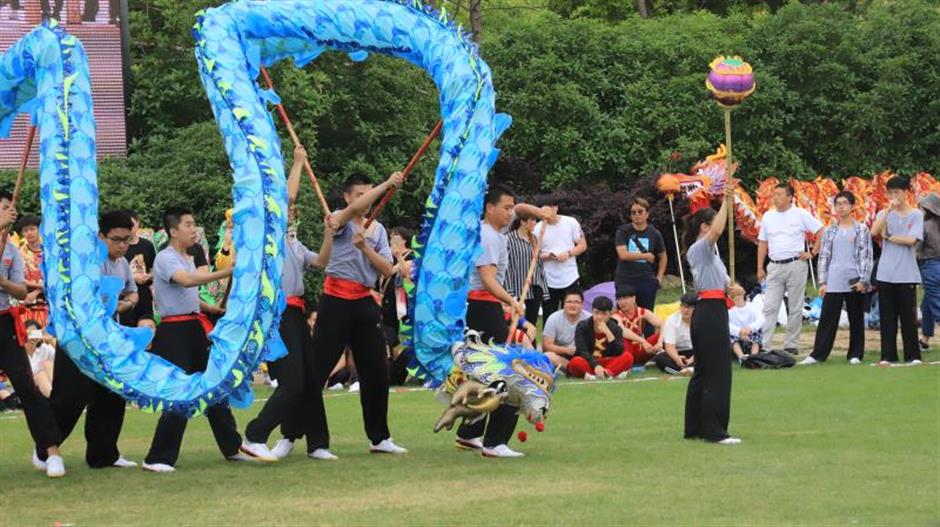Dragon boat racing along a deep current of heritage

The female dragon boat team from Shanghai Ocean University competes at the China Longzhou Tournament’s Changsha stop, in Hunan Province.
When the Chinese celebrate the annual Dragon Boat Festival on June 18, they will be drawing on a heritage dating back more than 2,000 years.
The racing that has come to be associated with the holiday is said to have originated in the legend of people paddling out to save the poet Qu Yuan (343-278 BC), who drowned himself in a river to protest the rampant corruption of his era.
The rescue boats beat drums and splashed water in order to keep fish and evil spirits from the poet’s body.
Today, dragon boat racing is all about fun, but its roots in folk culture go much deeper. The government is intent on preserving that rich past for generations to come.
Shanghai Ocean University, in a nod to that policy, initiated a dragon boat class as part of its sports course in 2015. It was an enhancement of a student dragon boat club that has been running for more than 10 years.
The class has become quite popular. This year, it was incorporated into the university’s curricula on ideology and politics.
The student club and course also form the backbone of a dragon boat team, which is now preparing for the Asian Dragon Boat Championships next month.
Chi Huanqi, one of the three teachers of the class and coach of the university’s dragon boat team, said the course is aimed at instilling patriotism and teamwork in students.
“For me, the dragon boat class is not only physical training but also a sort of chicken soup for the soul,” said Liu Wei, one of the students. “Sometimes when we feel exhausted and nearly give up, Chi urges us on and reminds us that our competitors are working harder than us.”
Chi started work at the university in 2012, when the sports curriculum was limited to the likes of soccer and basketball. The idea of starting a dragon boat class was nurtured by the importance of the event in Chinese history.
“At the beginning, there were only 30 students in a class, and each teacher gave three classes a week,” Chi told Shanghai Daily. “Now, it covers all students and is held every day.”

Chi Huanqi teaches his students how to row a dragon boat during his class.
Saniya Amaier, a 22-year-old ethnic minority student from the Xinjiang Uygur Autonomous Region, never saw a dragon boat before she became a member of the dragon boat team.
In 2016, she took a three-day train trip from her hometown to the school to attend her first race.
“It was sizzling hot during the six-day training before the match,” she told Shanghai Daily. “The coaches scheduled training sessions to avoid the hottest times of the day.”
Saniya said she was thrilled by the first championship won by the women’s team in April. It ranked top in three races at the China Longzhou Tournament in Changsha.
“Many of us had tears in our eyes when we won the cup,” she said. “We had been working so hard for such a long time. I think learning traditional culture can enrich the minds of the young.”
Luo Xiaoyun, another student of the class, said team members feel proud to stand under the flag of China.
“We need put patriotism into action,” he said.
Zhang Yaqiang, 21, the newly elected head of the dragon boat club, said his focus has shifted from personal achievement to teamwork.
“During my first year in the club, I was blindly seeking self-improvement and neglected the importance of teamwork,” he said. “But from the second year, I began offering my help to younger team members.”
He said every member of the team is doing a small bit to carry on a rich heritage.

Fudan University has initiated a dragon and lion dancing course as part of its sports curriculum.
In pursuit of cultural preservation, Fudan University in Shanghai has initiated a dragon and lion dancing course as part of its sports curriculum. This class, which started in 2013, has attracted about 500 students.
According to teacher Hua Miaolin, the course was added to the curriculum after a dragon and lion dancing performance at a sports event at the university proved to be an exciting success.
This year, the class will be compiling a course textbook to supplant those used from other schools.
“Many of our students will go to different countries for further study,” Hua explained. “We hope they will take Chinese traditional culture, like martial arts, Chinese opera and the dragon and lion dances overseas to foreign audiences.”
East China University of Science and Technology has opened 15 elective classes on traditional culture. The curriculum tries to introduce classic literature and Chinese mythology in a contemporary framework.
For example, Wu Sizeng, a teacher of folk culture, uses the popular historical TV drama “The Legend of Miyue” to explain how ancient people held wedding ceremonies.
Students are also encouraged to do projects on traditional culture, and some have resulted in published academic papers.
“Those of us who grew up in the generation after China opened to the outside world have been surrounded by Western culture that came to be considered fashionable and modern,” wrote student He Tianlei in a midterm exam for the Chinese culture class. “Through this class, I have come to learn that human civilization is not only about Western influences but also about our own Chinese heritage.”















